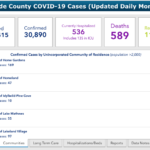I am deviating from my plan to write more about the history of healthcare and the U.S. government because of Saturday’s Campaign for Guaranteed Healthcare rallies, and offer this attempt to guide thinking about solving the problem of healthcare. I believe the conclusion follows logically from the statements, but you might reach a different conclusion if you don’t agree with an item. If so, please write. We need to develop an informed electorate who communicates with our representatives; dialogue is one way to get there.
• No one can afford to be sick in America (well, almost no one).
• Therefore, if I get sick, someone who is healthy must pay for it (sorry, this means that men need to pay for maternity care, and women need to pay for prostate exams — we are not paying for our own care).
• The most cost-effective way for someone else to pay for it is for everyone else to pay for it.
• Insurance companies, even the so-called not-for-profit ones, make money by denying care, unlike Medicare, whose sole purpose is to pay for healthcare. Why should shareholders profit from illness?
• Although Americans do not like being told what to do by the government, why do we have less problem being told what to do by United Healthcare, Cigna, BC/BS and other companies we don’t vote for. Nevertheless, Medicare is extremely popular (77 percent in a recent poll) and paying for healthcare with a payroll tax works well. (An estimate for Medicare-for-All puts that tax at 3.3 percent, much lower than the 7 to 12 percent businesses spend when they provide health insurance).
• Americans change jobs about every four years. Tying health insurance to employment no longer makes sense.
• Healthcare is too expensive and costs are rising too quickly so regulation of costs is necessary. Cutting out the middleman (there are almost twice as many health-insurance workers as physicians in the U.S.), negotiating drug and other prices, and shifting care away from the emergency rooms and hospitals will cut $243 billion from healthcare costs.
• Having a single system will improve data collection so we will have a better idea about what works, what doesn’t and what it costs. Science-driven medicine is better medicine.
• Improved Medicare-for-All, the only rational solution, is not socialized medicine and it would not limit choice of physician, hospital or other provider. The government would not be in charge of your healthcare, just in charge of paying for it.
More history next time; imagine what President Nixon proposed!
Dr. Kluzak, an Idyllwild resident, is board certified in Anatomic Pathology, Obstetrics and Gynecology. He also is a freelance photographer for the Town Crier.










